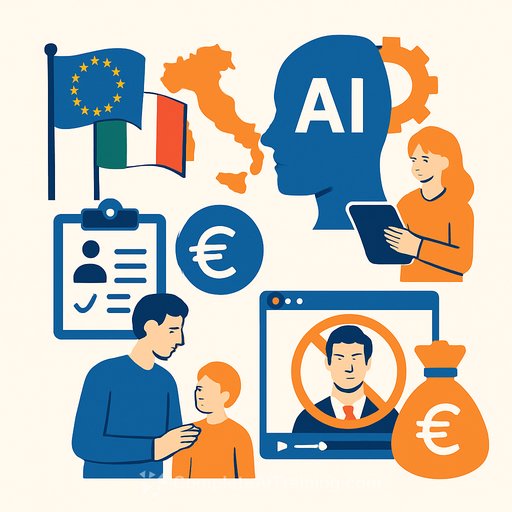Italy Enacts First National AI Law in the EU: What Legal Teams Need to Know
Italy is the first EU member state to pass a national, comprehensive AI law. The framework closely tracks the EU AI Act while adding country-specific rules grounded in human-centric, transparent, and safe use of AI.
The law's core objective is clear: enable innovation while safeguarding privacy and cybersecurity. It sets mandatory traceability and human oversight for AI-driven decisions across critical sectors.
Scope and Cross-Sector Obligations
- Covered sectors: healthcare, justice, education, and public administration.
- Traceability: organizations must maintain decision logs and provenance for AI outputs where applicable.
- Human oversight: meaningful human review is required for consequential decisions, especially those affecting rights and access to services.
Governance and Supervisory Bodies
The government designated the Agency for Digital Italy (AgID) and the National Cybersecurity Agency (ACN) as primary authorities for implementation and enforcement. Expect technical guidelines and sector-specific interpretations from these bodies.
Protections for Minors
AI access for children under 14 requires parental consent. Legal and compliance teams should implement age-gating, consent capture, and auditing mechanisms for youth-facing products and services.
Criminal Liability and Enforcement
- Deepfakes and harmful AI content: unlawful dissemination that causes harm can trigger prison sentences of one to five years.
- AI-enabled crimes: stricter penalties apply when AI is used to commit offenses such as identity theft or fraud.
Counsel should review incident response plans and evidence preservation workflows for AI-generated content, including takedown, notification, and cooperation protocols with authorities.
Copyright and Human Authorship
Works created with AI assistance receive protection only when they reflect genuine human intellectual effort. IP teams should update authorship policies, contributor agreements, and submission guidelines to document human creative contribution.
Economic Measures
The law authorizes up to €1 billion via a state-backed venture capital fund to support AI, cybersecurity, and related technologies. Some critics argue this is modest compared to international investment levels, but it signals national commitment and may come with compliance expectations.
Action Checklist for In-House Counsel and Compliance
- Map AI use: inventory systems impacting healthcare, justice, education, and public administration; classify decision risk and rights impact.
- Build traceability: implement logging for model inputs, outputs, and material prompts; retain audit trails proportionate to risk.
- Human-in-the-loop: define thresholds for mandatory review; document reviewer authority, escalation paths, and overrides.
- Age and consent controls: deploy reliable age verification and parental consent capture for under-14 access; log attestations.
- Vendor contracts: add clauses on data provenance, model updates, incident reporting, audit rights, and deepfake misuse safeguards.
- Content integrity: implement provenance markers and detection for synthetic media; define policies for labeling and takedown.
- Security alignment: coordinate with ACN-aligned controls; update threat models for AI-enabled fraud and identity abuse.
- Training and governance: update policies, run role-based training, and assign clear accountability across legal, product, and security.
- EU AI Act interplay: map obligations under both regimes; use the stricter requirement as your baseline where rules overlap.
Interaction with the EU AI Act
Italy's law complements the EU AI Act and introduces national specifics (e.g., parental consent, criminal provisions, designated authorities). Companies operating in Italy should treat this as an additional compliance layer on top of EU requirements.
EU AI Act overview (European Commission)
What to Watch Next
- Guidance from AgID and ACN on traceability standards, human oversight criteria, and sectoral expectations.
- Clarifications on evidentiary thresholds for deepfake-related offenses and definitions of "harm."
- Recommended methods for age verification and parental consent recordkeeping.
Agency for Digital Italy (AgID)
Bottom Line
Italy's AI law sets concrete duties across high-impact sectors, adds criminal exposure for misuse, and codifies a human-authorship threshold in copyright. Legal teams should operationalize traceability, human oversight, and youth protections now, and prepare for further guidance from the national authorities.
Your membership also unlocks:






